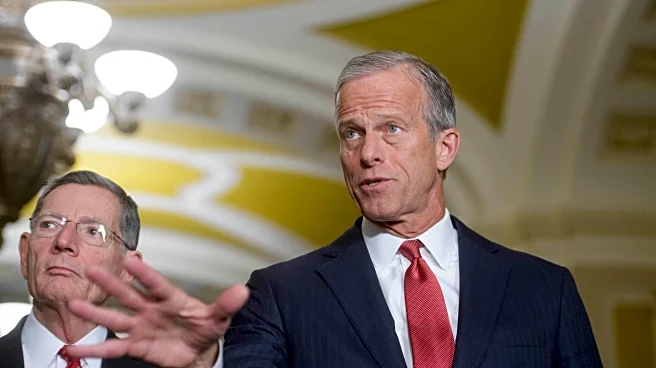What's Happening?
Hamas has agreed to release hostages as part of a ceasefire deal brokered by President Trump, following U.S. persuasion that hostages were a 'burden' to keep. The agreement marks the first phase of a ceasefire between Israel and Hamas, celebrated by Palestinians in Gaza. The U.S. Central Command (CENTCOM) is assembling a stabilization force, including troops from Egypt, Turkey, and the UAE, to support the ceasefire implementation. Within two weeks, a command post will be established in Gaza, with 200 American troops assisting in its construction.
Why It's Important?
The release of hostages is a significant step towards de-escalating tensions between Israel and Hamas, potentially paving the way for further peace negotiations. The involvement of international forces in the stabilization effort underscores the global interest in resolving the conflict and restoring stability to the region. This development could improve diplomatic relations and reduce the humanitarian impact of the conflict on civilians. The U.S.'s role in brokering the deal highlights its influence in Middle Eastern politics and its commitment to facilitating peace.
What's Next?
The establishment of a command post and the deployment of international forces are critical next steps in ensuring the ceasefire's success. The stabilization force will focus on maintaining peace and supporting humanitarian efforts in Gaza. Continued diplomatic engagement and monitoring will be necessary to prevent further hostilities and ensure compliance with the ceasefire terms. The international community will likely watch closely for any signs of renewed conflict or violations of the agreement.
Beyond the Headlines
The hostage release and ceasefire agreement reflect broader geopolitical dynamics, including the role of the U.S. in Middle Eastern affairs and the complex relationships between regional powers. The situation raises ethical considerations regarding the use of hostages in conflict and the responsibilities of international actors in negotiating peace. The involvement of multiple countries in the stabilization effort highlights the interconnected nature of global politics and the importance of collaborative approaches to conflict resolution.











